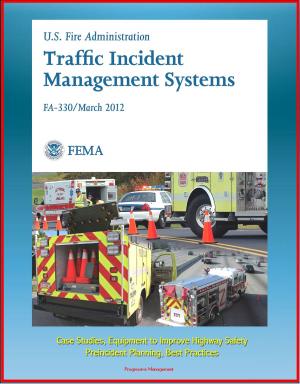Biopower Technical Strategy Workshop: Challenges to Expanded Use of Biopower, Technology Research, Feedstocks, Market Transformation
Nonfiction, Science & Nature, Science, Physics, Energy, Technology, Agriculture & Animal Husbandry| Author: | Progressive Management | ISBN: | 9781466161450 |
| Publisher: | Progressive Management | Publication: | March 9, 2012 |
| Imprint: | Smashwords Edition | Language: | English |
| Author: | Progressive Management |
| ISBN: | 9781466161450 |
| Publisher: | Progressive Management |
| Publication: | March 9, 2012 |
| Imprint: | Smashwords Edition |
| Language: | English |
This report, converted for accurate flowing-text ebook format reproduction, summarizes the results of a workshop sponsored by the DOE/EERE Biomass Program in Denver, Colorado, on December 2-3, 2009. The workshop was convened to identify and discuss challenges to the expanded use of biopower and the possible solutions, including technology research, development, and demonstration (RD&D) as well as policies and other market transformation mechanisms. Topics covered include woody biomass, animal waste, landfill gas; direct firing, combined heat and power (CHP), cofiring, gasification, pyrolysis, torrefaction, anaerobic digestion, large-scale systems, and more.
Contents: Introduction * Current State of the Biopower Industry * Pretreatment and Conversion Technologies * Large-Scale Systems * Smaller-Scale Systems * Feedstocks for Biopower * Market Transformation and Other Actions * Cross-cutting Themes
Today, other than hydroelectricity, biopower is the largest source of renewable electricity in the world and accounts for more power generation than wind and solar combined. Globally, most biopower today is generated from solid biomass (e.g., wood) with smaller amounts from biogas, municipal solid waste (MSW), and biofuels (IEA 2007). In 2008, the net summer capacity of the U.S. biopower industry, which contributes about $10 billion to the economy annually, was approximately 11,050 megawatts (MW), including wood, landfill gas, MSW, and other waste biomass (EIA 2010). Most of today's biopower plants are direct-fired systems producing 50 MW or less of electricity. Plants are owned and operated by a wide range of stakeholders, from industrial users (e.g., pulp and paper mills and lumber companies), to utilities, independent power producers, and small-scale community users (e.g., institutional users). Independent power producers and industrial combined heat and power (CHP) facilities account for about 83% of net biomass summer generating capacity.
Biopower is a fairly mature technology with hundreds of successful commercial-scale operations. Many technologies are potentially available to transform raw biomass material directly or indirectly into electricity, including direct firing, cofiring of biomass with coal or natural gas, gasification, pyrolysis, torrefaction, pelletization, and anaerobic digestion. These technologies are in various stages of development and use. Over 50% of biopower facilities are utilizing higher-efficiency CHP systems to provide both heat and power.
Despite the benefits of biopower and the compelling economic and environmental drivers, there are still significant barriers to the realization of a widespread, sustainable U.S. biopower industry. Some of the major challenges today include ensuring the availability of a sustainable biomass supply, improving the efficiency and cost of conversion technologies, exploring more cost-effective ways to utilize biomass (e.g., advanced pretreatment), and addressing the economic and other ramifications of an uncertain policy and regulatory climate (e.g., carbon, environment, permitting, and RPS).
This report, converted for accurate flowing-text ebook format reproduction, summarizes the results of a workshop sponsored by the DOE/EERE Biomass Program in Denver, Colorado, on December 2-3, 2009. The workshop was convened to identify and discuss challenges to the expanded use of biopower and the possible solutions, including technology research, development, and demonstration (RD&D) as well as policies and other market transformation mechanisms. Topics covered include woody biomass, animal waste, landfill gas; direct firing, combined heat and power (CHP), cofiring, gasification, pyrolysis, torrefaction, anaerobic digestion, large-scale systems, and more.
Contents: Introduction * Current State of the Biopower Industry * Pretreatment and Conversion Technologies * Large-Scale Systems * Smaller-Scale Systems * Feedstocks for Biopower * Market Transformation and Other Actions * Cross-cutting Themes
Today, other than hydroelectricity, biopower is the largest source of renewable electricity in the world and accounts for more power generation than wind and solar combined. Globally, most biopower today is generated from solid biomass (e.g., wood) with smaller amounts from biogas, municipal solid waste (MSW), and biofuels (IEA 2007). In 2008, the net summer capacity of the U.S. biopower industry, which contributes about $10 billion to the economy annually, was approximately 11,050 megawatts (MW), including wood, landfill gas, MSW, and other waste biomass (EIA 2010). Most of today's biopower plants are direct-fired systems producing 50 MW or less of electricity. Plants are owned and operated by a wide range of stakeholders, from industrial users (e.g., pulp and paper mills and lumber companies), to utilities, independent power producers, and small-scale community users (e.g., institutional users). Independent power producers and industrial combined heat and power (CHP) facilities account for about 83% of net biomass summer generating capacity.
Biopower is a fairly mature technology with hundreds of successful commercial-scale operations. Many technologies are potentially available to transform raw biomass material directly or indirectly into electricity, including direct firing, cofiring of biomass with coal or natural gas, gasification, pyrolysis, torrefaction, pelletization, and anaerobic digestion. These technologies are in various stages of development and use. Over 50% of biopower facilities are utilizing higher-efficiency CHP systems to provide both heat and power.
Despite the benefits of biopower and the compelling economic and environmental drivers, there are still significant barriers to the realization of a widespread, sustainable U.S. biopower industry. Some of the major challenges today include ensuring the availability of a sustainable biomass supply, improving the efficiency and cost of conversion technologies, exploring more cost-effective ways to utilize biomass (e.g., advanced pretreatment), and addressing the economic and other ramifications of an uncertain policy and regulatory climate (e.g., carbon, environment, permitting, and RPS).















